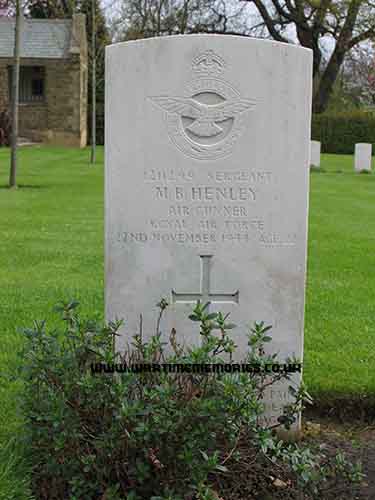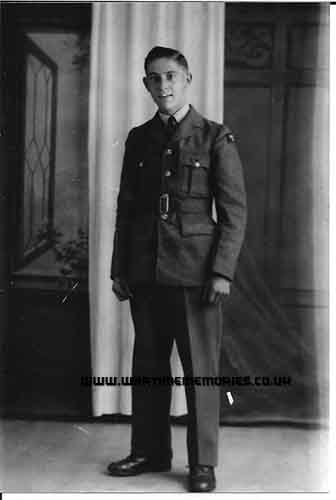From the memories of John Cox (nephew):
On the fateful night when Benny Henley died, they are not sure why, whether it was because of a heavy bomb load or a faulty engine, pilot Ross Flood had to make several attempts before they could get airborne. This put him behind the rest of the squadron so he would have had to have made up the distance in order to catch up and join them on their way to the submarine targets in the Norwegian fjords. The bombing raid was successful and they started their return to RAF East Kirby, Spilsby, Lincolnshire, North England.
They crashed onto Sunk Island Sands, East Riding of Yorkshire, near the Humber Estuary, there was no evidence that the crew were aware of having to make a forced landing, all crew were still in their seats on the airplane, as opposed to being moved to the bulkhead which would have been the safest area. There was one initial survivor, but he never regained consciousness and died in hospital.
The general thought is that 1 of 2 things may have happened:-
- 1. Fuel guages may have been faulty and fuel would have been used in the extra efforts to get the plane up on the way to the bombing
- 2. The Lancaster1 was an early model and it's known that some of them had dropped out of the sky, but there was nothing to say that this was the case
Memories of Derek Cox (nephew) regarding Benny's death:
It was a few weeks later that I came home from school at lunchtime to find Mom blackleading the grate of our fireplace and I couldn't help noticing she was crying. I was shocked to the core, Mothers don't cry. In answer to my question of why she was in this state she simply pointed to an envelope sitting on the mantle shelf. The letter was from Aunt Stella, it was short, less than one page of notepaper and simply said that "Ben will not be coming home again". It went on to say he and all the crew were dead.
Some thirty years later, Uncle Ray (Benny's brother) met, at a service men's reunion, a couple of RAF veterans who had been at East Kirby at that time and were told that on the day, November 22nd 1944, Ben's aircraft, a Lancaster Bomber, E for Easy, serial number I.I.949 of 630 Squadron, piloted by a New Zealander, Pilot Office Ross Flood, had trouble getting off the ground to start their flight to Trondheim, Norway and had made three runs before getting airborne. It was thought that the fuel used up getting airborne resulted in the plane simply running out of gas on the return flight.
In a publication entitled "Lincolnshire Air War, 1935-45" the crash is mentioned as occuring "near the Humber" which is a major river on England's east coast. Initially listed as missing, the plane was first spotted by an area farmer, working his field, on a sand bank at the estuary to the river. The local lifeboat reached the wreckage before it was covered by the incoming tide and one of the crew was found alive, but died a few days later.
If this is what happened, and it was not an uncommon occurrence that loaded bombers had such difficulties, it begs the question as to why PO Flood couldn't have made for one of the many other airfields which would have been within reach. Also, why did all of the 7 crew members die? Their shortage of fuel would have been known for some time and some, if not all, of the crew could surely have parachuted to safety.
Another authority on these types of losses is Dave Newham, an English fiction writer, who was an RAF photographer and who has developed a special interest in the wartime airfields of Lincolnshire and the east coast. My brother, John, has met with Dave and been shown Dave's plotted map of E-Easy's flightpath which shows that it would have flown over several miles of England's east coast and been able to land at alternative airfields. It was also learned that each of the crew were found at their operational station. When it's known that a crash landing is inevitable, crew members were gathered at the plane's main bulkhead, over the wing's main spar, with only the pilot and flight engineer remaining at their usual places.
Although we will never know what happened on the flight's final moments, it is reasonable to assume that there was no warning of the crash. Was it pilot error, with PO Flood falling asleep at the "wheel"?





